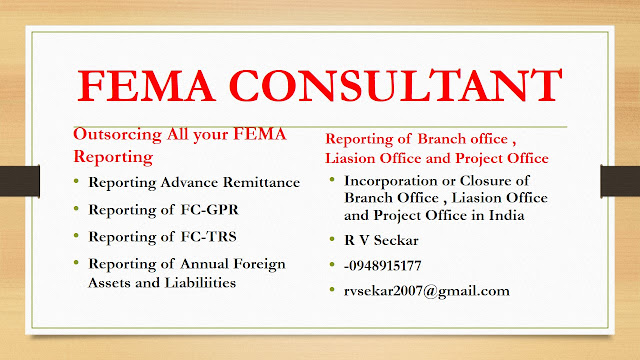NOW ,100% FDI under
automatic route is permitted only in marketplace
model of e-commerce and FDI is not permitted in
inventory based model of e-commerce.
Review of policy on Foreign Direct Investment (FDI) in
e-commerce
1.0 To provide clarity to FDI policy on e-commerce
sector, Para 5.2.15.2 of the Consolidated FDI Policy Circular 2017 will now
read as under:
5.2.15.2 E-commerce activities
|
Sector/Activity
|
%
of Equity/FDI Cap
|
Entry
Route
|
|
E-commerce
activities
|
100%
|
Automatic
|
5.2.15.2.1 Subject to provisions of FDI Policy, e-commerce entities would
engage only in Business to Business (B2B) e-commerce and not in Business to
Consumer (B2C) e-commerce.
5.2.15.2.2 Definitions:
i) E-commerce- E-commerce
means buying and selling of goods and services including digital products over
digital & electronic network.
ii) E-commerce entity-
E-commerce entity means a company incorporated under the Companies Act 1956 or
the Companies Act 2013 or a foreign company covered under section 2 (42) of the
Companies Act, 2013 or an office, branch or agency in India as provided in
section 2 (v) (iii) of FEMA 1999, owned or controlled by a person resident
outside India and conducting the e-commerce business.
iii) Inventory based model of e-commerce- Inventory
based model of e-commerce means an e-commerce activity where inventory of goods
and services is owned by e-commerce entity and is sold to the consumers
directly.
iv) Marketplace based model of e-commerce- Marketplace
based model of e-commerce means providing of an information technology platform
by an e-commerce entity on a digital & electronic network to act as a
facilitator between buyer and seller.
5.2.15.2.3 Guidelines for
Foreign Direct Investment on e-commerce sector
i) 100% FDI
under automatic route is permitted in marketplace model of e-commerce.
ii) FDI is not
permitted in inventory based model of e-commerce.
5.2.15.2.4
Other Conditions
i) Digital
& electronic network will include network of computers, television channels
and any other Internet application used in automated manner such as web pages,
extranets, mobiles etc.
ii) Marketplace
e-commerce entity will be permitted to enter into transactions with sellers
registered on its platform on B2B basis.
iii) E-commerce
marketplace may provide support services to sellers in respect of warehousing,
logistics, order fulfillment, call centre, payment collection and other
services.
iv) E-commerce entity
providing a marketplace will not exercise ownership or control over the
inventory i.e. goods purported to be sold. Such an ownership or control over
the inventory will render the business into inventory based model. Inventory of
a vendor will be deemed to be controlled by e-commerce marketplace entity if
more than 25% of purchases of such vendor are from the marketplace entity or
its group companies.
v) An
entity having equity participation by e-commerce marketplace entity or its
group companies, or having control on its inventory by e-commerce marketplace
entity or its group companies, will not be permitted to sell its products on
the platform run by such marketplace entity.
vi) In marketplace
model goods/services made available for sale electronically on website should clearly
provide name, address and other contact details of the seller. Post sales,
delivery of goods to the customers and customer satisfaction will be
responsibility of the seller.
vii) In marketplace model,
payments for sale may be facilitated by the e-commerce entity in conformity
with the guidelines of the Reserve Bank of India.
viii) In marketplace model, any
warrantee/ guarantee of goods and services sold will be responsibility of the
seller.
ix) E-commerce
entities providing marketplace will not directly or indirectly influence the
sale price of goods or services and shall maintain level playing field.
Services should be provided by e-commerce marketplace entity or other entities
in which e-commerce marketplace entity has direct or indirect equity
participation or common control, to vendors on the platform at arm’s length and
in a fair and non-discriminatory manner. Such services will include but not
limited to fulfillment, logistics, warehousing, advertisement/ marketing,
payments, financing etc. Cash back provided by group companies of marketplace
entity to buyers shall be fair and non-discriminatory. For the purposes of this
clause, provision of services to any vendor on such terms which are not made
available to other vendors in similar circumstances will be deemed unfair and
discriminatory.
x) Guidelines on cash
and carry wholesale trading as given in para 5.2.15.1.2 of Consolidated FDI
Policy Circular 2017 will apply on B2B e-commerce.
xi) e-commerce
marketplace entity will not mandate any seller to sell any product exclusively
on its platform only.
xii) e-commerce
marketplace entity will be required to furnish a certificate along with a
report of statutory auditor to Reserve Bank of India, confirming compliance of
above guidelines, by 30th of September of every year for the preceding
financial year.
Subject to the conditions of FDI policy on services sector and applicable
laws/regulations, security and other conditionalities, sale of services through
e-commerce will be under automatic route.
3.0 The above decision will take effect from 01
February, 2019.
How recent FDI policy changes in e-commerce will impact
E-Commerce Operators in India .
It will be a major jolt to Walmart’s $16 billion
acquisition of Flipkart and Amazon’s $5 billion bet
on India, the government announced changes to the foreign direct investment (FDI) policy for the
e-commerce sector that could trigger a shakeup in the way leading platforms such
as Amazon and Flipkart conduct business in the country.
The move should mollify
brick-and-mortar retailers, which have had a longstanding grievance against
ecommerce sites for offering discounts to win over customers.
A new rule inserted in the policy bars any entity related to
ecommerce platforms from selling on that site and imposes a limit on how much
one vendor can sell on a particular portal.
The policy also prohibits
e-commerce platforms from giving any preferential treatment to any supplier.






